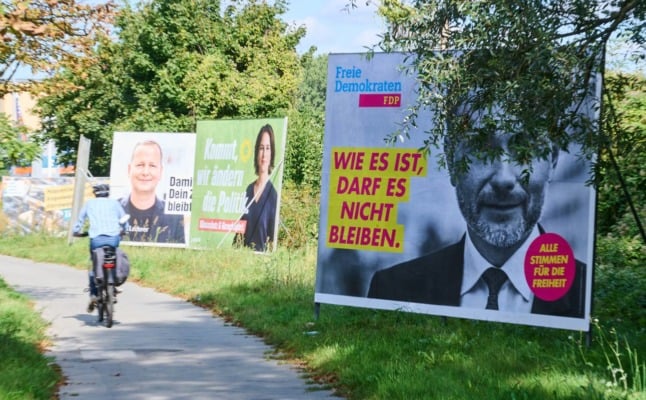More immigration needed in Germany to prop up pension system
Immigration is a huge topic ahead of the September 26th election. And today the pro-business Free Democrats have been sharing their views on it, as well as the pension system.
The FDP say many more workers from abroad – half a million per year – are needed to help keep the German pension system functioning.
“We need a fundamental rethink in migration policy,” parliamentary group vice chairman and financial politician Christian Dürr told DPA.
“If we manage to make Germany an open, modern immigration country and at the same time stabilise the pension, we will gain more as a society than we can imagine today.”
READ ALSO: ‘Germany needs more immigrants to fill jobs’
Dürr accused the CDU/CSU and the SPD of putting the financing of pensions on the back burner which he said is a fatal mistake.
For the next federal government, he said, the ageing society will be a major challenge. He said more people were retiring but fewer contributors were entering the labor market.
“The state already has to subsidise pension insurance with large sums of money,” Dürr said. “In the long run, we can’t afford that.”
The FDP is proposing a reform of pension financing based on higher migration into the labour market and an equity pension, in which pension funds invest in stocks to generate higher returns.
“If we want to stabilise our public finances and reduce debt, our country needs at least 500,000 immigrants per year,” Dürr said.
The FDP advocates for a points-based system based on the Canadian model to increase immigration.
People who want to come to Germany would be classified according to education, work experience, language skills and age. Meanwhile, Germany should make it easier to recognise professional qualifications gained abroad, according to the FDP.
READ ALSO: Where do Germany’s political parties stand on dual citizenship and nationalities
In the debates for the leading candidates in the Bundestag elections, the financing of pensions has been controversial lately. Green Party candidate for chancellor Annalena Baerbock also spoke out in favour of more immigration of skilled workers. The Left Party leader Janine Wissler called for politicians and civil servants to pay into the statutory pension fund.
Chancellor candidates Olaf Scholz (SPD) and Armin Laschet (CDU/CSU) have been arguing about whether young people should be guaranteed that the retirement age and pension level remains stable. Scholz advocates for this guarantee, while Laschet said it doesn’t need to be considered at the moment.
The latest polls
Here’s a snapshot of some of the latest polls on Wednesday, with SPD still in the lead ahead of the CDU/CSU.
Who's ahead in the polls in Germany?https://t.co/fmAlOgb5eR
Our current poll of polls:
SPD: 25% (+5)
CDU/CSU: 21% (-12)
Greens: 16% (+7)
FDP: 12% (+1)
AfD: 11% (-1)
Left: 6% (-3)+/- vs. 2017 result#btw21 pic.twitter.com/bewJ9TXC6a
— POLITICO Poll of Polls (@pollofpolls_EU) September 15, 2021
Bavaria’s Söder sees signs of a turnaround for conservatives
Despite the polls, CSU leader Markus Söder remains confident that CDU/CSU can win the election race.
“We are already seeing the first signs of a turnaround,” Söder said on Wednesday. “I think anything is possible, we can still catch up with the SPD. It is much closer than most believe at the moment.”
Söder is confident that the CDU/CSU – also known as the Union – would become the strongest force in the federal election.
“We will be ahead on election night,” he said. Söder went on to compare politics to football, saying “you have to be an optimist, as a fan of FC Nuremberg anyway”.
We won’t pretend we know much about German football, but Nuremberg must not be at the top of the Bundesliga right now – I guess we’ll just have to wait and see if they make a comeback.
Laschet caught out by children
There was another awkward moment for the CDU’s Armin Laschet, who’s bidding to become the next Angela Merkel.
Laschet – and the SPD’s Olaf Scholz – faced a series of questions from young people, on a range of issues.
One of the youngsters – Romeo – asked about Laschet’s position on marriage for all. Laschet denied he had been against same-sex marriage before Germany voted to legalise it in 2017.
In true professional style, Romeo referred to a previous interview in Spiegel where Laschet had said that as a member of the Bundestag he had voted against the motion on same-sex marriage by the SPD. Laschet tried to dodge the answer by saying: “You were already reading Spiegel so long ago? That’s great.”
To which Romeo replied, “Nah, I Googled it.”
Romeo befragt #Laschet in #LateNightBerlin zur Ehe für alle: "Du hast Interviews gegeben, wo du gesagt hast, du willst das nicht."
Laschet: "Nein, das stimmt nicht."
Romeo: "Im Spiegel."
Laschet: "Du hast schon den Spiegel gelesen vor so langer Zeit?" (1/2) pic.twitter.com/yzYhWbxNs6— Malte Kreutzfeldt (@MKreutzfeldt) September 15, 2021
Scholz also had to deal with hard questions.
Romeo, for instance, asked Scholz why children have drowned in the sea because they want to get to Germany, and why a plane was not sent to them to pick them up.
Scholz replied that many people were looking for ways to come to Germany that were not safe. He said authorities had to try and save them, and make their homeland safer.
Hats off to the young people asking the tough questions.
Scholz: No tax cuts for the rich
In a Tuesday interview on ZDF talk show Klartext, SPD chancellor candidate Olaf Sholz declared that “there will be no leeway for tax cuts” for the rich after the election.
In order to ease the tax burden on lower and middle incomes – as he plans – “you have to make sure that those who have a lot contribute a little more,” he told the interviewers.




 Please whitelist us to continue reading.
Please whitelist us to continue reading.
Member comments